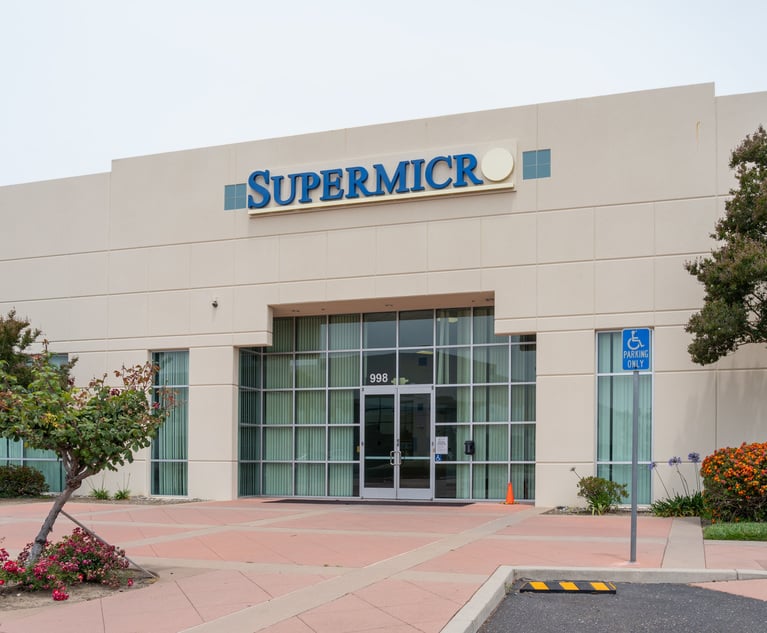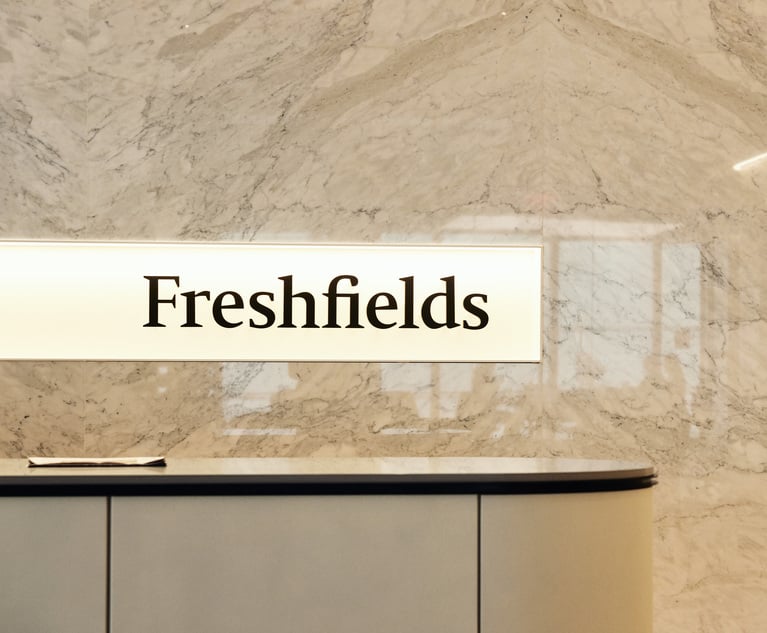3 Securities Cases to Watch at the Supreme Court This Term
Three significant securities law decisions highlight the new Supreme Court session, which will be the first complete term for Justice Neil Gorsuch.
September 20, 2017 at 01:57 PM
25 minute read
Three significant securities law decisions highlight the new Supreme Court session, which will be the first complete term for Justice Neil Gorsuch. These cases, two of which involve Bay Area companies, concern the liability of public companies in private lawsuits for failing to comply with the disclosure requirements of the Securities and Exchange Commission (SEC); whether plaintiffs may bring class action lawsuits in state courts alleging false and misleading statements in registration statements for public offerings, or whether such actions may be filed only in federal court; and whether corporate whistleblowers must have reported to the SEC, rather than just internally, in order to file lawsuits in federal court alleging that they were victims of retaliation.
Leidos v. Indiana Public Retirement System
This case, scheduled for oral argument on Nov. 6, concerns the SEC's requirement that the annual and other reports of public companies provide information as instructed by the SEC's Regulation S-K. Item 303 of Regulation S-K requires annual reports to include Management's Discussion and Analysis of Financial Condition and Results of Operation (MD&A). The MD&A, among other things, directs companies to describe “any known trends or uncertainties” that have had or that the company reasonably expects to have a materially favorable or unfavorable impact on sales, revenue or income from continuing operations. A disclosure duty arises when “a trend, demand, commitment, event or uncertainty” is both reasonably known to management and reasonably likely to significantly affect the company's financial condition or results of operations.
This content has been archived. It is available through our partners, LexisNexis® and Bloomberg Law.
To view this content, please continue to their sites.
Not a Lexis Subscriber?
Subscribe Now
Not a Bloomberg Law Subscriber?
Subscribe Now
NOT FOR REPRINT
© 2025 ALM Global, LLC, All Rights Reserved. Request academic re-use from www.copyright.com. All other uses, submit a request to [email protected]. For more information visit Asset & Logo Licensing.
You Might Like
View All
California Walnut Grower and German Investment Firm Vie for Lead Plaintiff Status in Super Micro Securities Action


Freshfields Hires Ex-SEC Corporate Finance Director in Silicon Valley

Miami Judge Approves Shaq's $11 Million Settlement to Resolve Astrals Investor Claims
3 minute readTrending Stories
- 1Law Firms Expand Scope of Immigration Expertise, Amid Blitz of Trump Orders
- 2Latest Boutique Combination in Florida Continues Am Law 200 Merger Activity
- 3Sarno da Costa D’Aniello Maceri LLC Announces Addition of New Office in Eatontown, NJ, and Named Partner
- 4Friday Newspaper
- 5Public Notices/Calendars
Who Got The Work
J. Brugh Lower of Gibbons has entered an appearance for industrial equipment supplier Devco Corporation in a pending trademark infringement lawsuit. The suit, accusing the defendant of selling knock-off Graco products, was filed Dec. 18 in New Jersey District Court by Rivkin Radler on behalf of Graco Inc. and Graco Minnesota. The case, assigned to U.S. District Judge Zahid N. Quraishi, is 3:24-cv-11294, Graco Inc. et al v. Devco Corporation.
Who Got The Work
Rebecca Maller-Stein and Kent A. Yalowitz of Arnold & Porter Kaye Scholer have entered their appearances for Hanaco Venture Capital and its executives, Lior Prosor and David Frankel, in a pending securities lawsuit. The action, filed on Dec. 24 in New York Southern District Court by Zell, Aron & Co. on behalf of Goldeneye Advisors, accuses the defendants of negligently and fraudulently managing the plaintiff's $1 million investment. The case, assigned to U.S. District Judge Vernon S. Broderick, is 1:24-cv-09918, Goldeneye Advisors, LLC v. Hanaco Venture Capital, Ltd. et al.
Who Got The Work
Attorneys from A&O Shearman has stepped in as defense counsel for Toronto-Dominion Bank and other defendants in a pending securities class action. The suit, filed Dec. 11 in New York Southern District Court by Bleichmar Fonti & Auld, accuses the defendants of concealing the bank's 'pervasive' deficiencies in regards to its compliance with the Bank Secrecy Act and the quality of its anti-money laundering controls. The case, assigned to U.S. District Judge Arun Subramanian, is 1:24-cv-09445, Gonzalez v. The Toronto-Dominion Bank et al.
Who Got The Work
Crown Castle International, a Pennsylvania company providing shared communications infrastructure, has turned to Luke D. Wolf of Gordon Rees Scully Mansukhani to fend off a pending breach-of-contract lawsuit. The court action, filed Nov. 25 in Michigan Eastern District Court by Hooper Hathaway PC on behalf of The Town Residences LLC, accuses Crown Castle of failing to transfer approximately $30,000 in utility payments from T-Mobile in breach of a roof-top lease and assignment agreement. The case, assigned to U.S. District Judge Susan K. Declercq, is 2:24-cv-13131, The Town Residences LLC v. T-Mobile US, Inc. et al.
Who Got The Work
Wilfred P. Coronato and Daniel M. Schwartz of McCarter & English have stepped in as defense counsel to Electrolux Home Products Inc. in a pending product liability lawsuit. The court action, filed Nov. 26 in New York Eastern District Court by Poulos Lopiccolo PC and Nagel Rice LLP on behalf of David Stern, alleges that the defendant's refrigerators’ drawers and shelving repeatedly break and fall apart within months after purchase. The case, assigned to U.S. District Judge Joan M. Azrack, is 2:24-cv-08204, Stern v. Electrolux Home Products, Inc.
Featured Firms
Law Offices of Gary Martin Hays & Associates, P.C.
(470) 294-1674
Law Offices of Mark E. Salomone
(857) 444-6468
Smith & Hassler
(713) 739-1250






